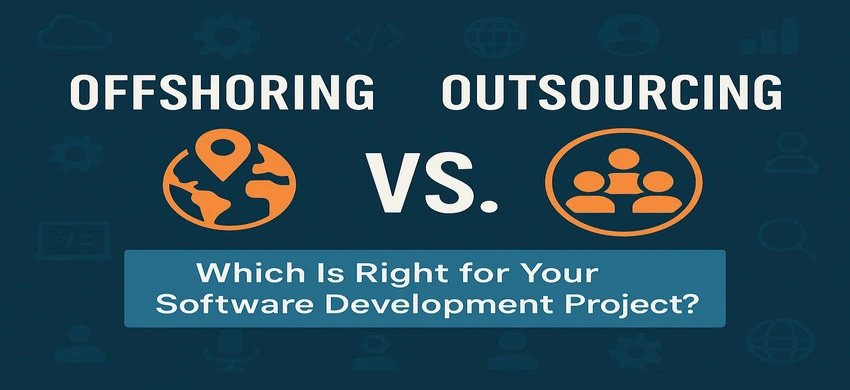
In the realm of software development, businesses often face the decision of whether to offshore or outsource their projects. Both strategies offer distinct advantages and challenges. Understanding these can help you make an informed choice that aligns with your project's goals, budget, and timeline.
What Is Offshoring?
Offshoring involves relocating business processes or operations to another country, typically to leverage cost advantages or access specialized skills. In the context of software development, this means establishing a development team or center in a foreign country.
Advantages of Offshoring
Cost Savings: Labor costs in certain countries can be significantly lower, reducing overall project expenses.
Access to Global Talent: Tap into a diverse pool of skilled developers with expertise in various technologies.
24/7 Development Cycle: Time zone differences can facilitate continuous development, speeding up project timelines.
Challenges of Offshoring
Communication Barriers: Differences in time zones and languages can lead to misunderstandings and delays.
Cultural Differences: Variations in work culture and practices may affect collaboration and productivity.
Management Complexity: Overseeing remote teams requires robust management practices and tools.
What Is Outsourcing?
Outsourcing refers to contracting out a business process or function to an external organization, which may or may not be located in another country. For software development, this means hiring a third-party company to handle all or part of the development process.
Advantages of Outsourcing
Expertise Access: Engage with specialized firms that bring in-depth knowledge and experience.
Scalability: Easily adjust the size of your development team based on project requirements.
Focus on Core Activities: Allows your internal team to concentrate on strategic initiatives while external experts handle development tasks.
Challenges of Outsourcing
Less Control: Reduced oversight over the development process can lead to misalignment with project goals.
Quality Assurance: Ensuring the outsourced team meets your quality standards requires diligent monitoring.
Dependency Risks: Relying on an external vendor can pose risks if the relationship deteriorates or if the vendor faces challenges.
Offshoring vs Outsourcing: A Comparative Overview
While both offshoring and outsourcing aim to optimize resources, they differ in execution:
Location: Offshoring involves relocating operations to another country, whereas outsourcing may involve contracting with third-party firms, regardless of their location.
Control: Offshoring often provides greater control over processes, while outsourcing may involve delegating control to an external provider.
Cost: Both strategies can offer cost savings, but the extent varies based on the specific circumstances and locations involved.
Strategic Considerations for Choosing Between Offshoring and Outsourcing
When deciding between offshoring and outsourcing for your software development project, it's essential to align your choice with your company's strategic goals and project requirements.
Long-Term vs. Short-Term Needs
Offshoring is often more suitable for long-term projects where establishing a dedicated team can lead to deeper integration and a more profound understanding of the company's culture and objectives. This approach is beneficial when the project requires ongoing development and maintenance.
On the other hand, outsourcing is typically more appropriate for short-term projects or specific tasks that need specialized expertise. It allows for flexibility and scalability without the commitment of long-term investment.
Control and Oversight
If maintaining a high level of control over the development process is crucial, offshoring might be the better option. By setting up a team in another country, you can establish processes and workflows that align closely with your company's standards.
However, if you're willing to delegate control to an external provider, outsourcing can be advantageous. It enables you to leverage the expertise of specialized vendors while focusing on your core business activities.
Access to Specialized Skills
Offshoring can provide access to a broad talent pool, especially in countries known for their technical expertise. This is particularly beneficial for projects requiring niche skills or advanced technologies.
Outsourcing also offers access to specialized skills, but the range may be more limited to the capabilities of the chosen vendor. It's important to assess whether the vendor's expertise aligns with your project's needs.
Communication and Collaboration
Effective communication is vital for the success of any software development project. Offshoring can facilitate better communication and collaboration, as the offshore team becomes an integral part of your organization.
Outsourcing may present challenges in communication due to differences in time zones, language, and cultural nuances. It's essential to establish clear communication channels and expectations to mitigate potential issues.
Conclusion
Choosing between offshoring and outsourcing for your software development project depends on various factors, including the project's duration, required expertise, desired level of control, and communication considerations. By carefully evaluating these aspects, you can make an informed decision that aligns with your company's strategic objectives and ensures the success of your project.
Also Read Generative AI Tools for Software Development
Custom Software Development: What It Is, Benefits, Types, and More



